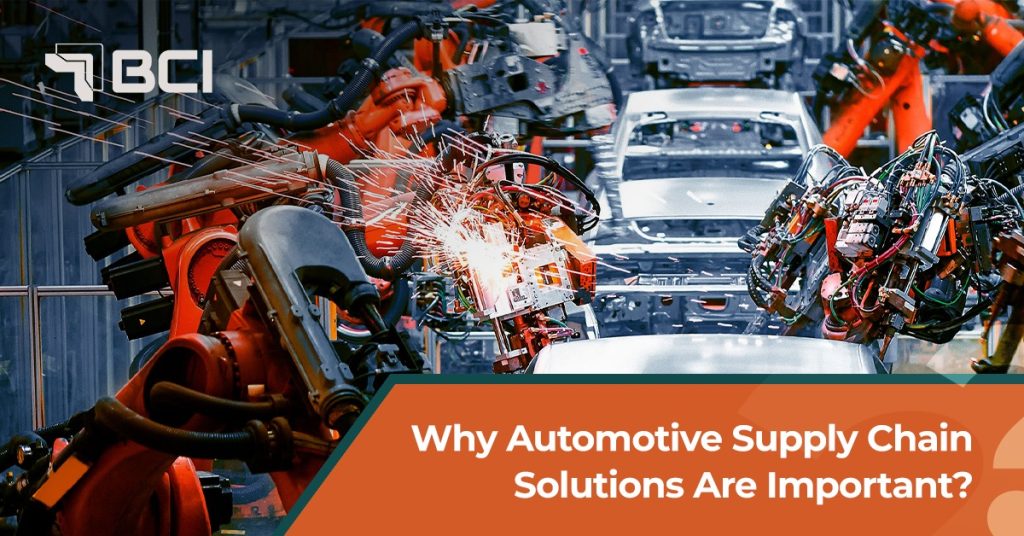Why Automotive Supply Chain Solutions Are Important?

Why Automotive Supply Chain Solutions Are Important
It’s actually mind-boggling when you consider the ridiculous level of complexity that automakers like Ford, Toyota, and GM have to choreograph across their supply chain networks every single day. Even something as seemingly insignificant as a backorder on some random plastic knob or rubber seal can completely derail an entire factory by grinding the assembly line to a halt.
This is why automotive supply chain management is so crucial for the manufacturers as well as the tens of thousands of suppliers making up that vast supplier pyramid. One little hiccup at any point in this intricate international dance of part shipping and transportation can potentially create catastrophic production delays, bloated inventory costs, and really ticked off customers. Not an ideal scenario in today’s age of impatient buyers and razor-thin automaker profit margins.
So to bring at least some method to the inevitable supply chain madness, automotive companies turn to specialized software, consulting partners and industry-specific best practices around automotive supply chain solutions. These “solutions” aim to coordinate manufacturers and their suppliers through every stage of the process – from strategic planning and procurement through production scheduling, logistics operations, and ultimately vehicle delivery and aftermarket service.
The Importance of Automotive Supply Chain Solutions
At the core, automotive supply chain solutions provide essential capabilities like:
– Real-time visibility into part/shipment locations and status across the entire global supply network through GPS, RFID tagging and other IoT tracking
– Collaboration portals connecting automakers and suppliers to share forecasts, schedules, quality data and other key information
– Mathematical models optimizing long-term sourcing strategies and manufacturing production plans given constraints like plant capacities and supplier commitments
– Transportation management to streamline freight shipping through load planning, routing, carrier selection and automated audit processes
– Plant scheduling systems synchronizing just-in-time part arrival sequences with mixed-model assembly lines
– Inventory optimization and spare parts logistics to maximize vehicle uptime and warranty service
– Business intelligence dashboards for scorecarding supplier performance, analyzing spend, identifying quality issues and more
Basically, these solutions help create transparency while orchestrating the precise choreography of all those 30,000 parts making their way from Point Everywhere to the Point of Final Assembly. It’s about enabling intelligent, data-driven decisions that balance priorities like production schedules, material constraints, logistics costs and consumer demand signals into one cohesive, hyper-optimized digital supply chain.
You can think of supply chain solutions as the automotive industry’s version of an air traffic control system for the zillions of planes… er, parts that need to diligently follow their preplanned journey without any delays or mishaps. Because even the slightest hiccup at a single point can completely gridlock the entire system.
Of course, keeping 30,000 unique parts for each vehicle model continuously flowing in the right quantities at the right pricing is already challenging enough. But automakers don’t have the luxury of just maintaining the dysfunctional status quo. They’re also under constant pressure to reduce costs, improve quality and get new innovative vehicles out faster in the face of rapidly shifting consumer preferences.
On top of that complexity, the entire automotive industry is in the early throes of transformative shifts like vehicle electrification, connectivity, autonomy and new mobility business models. These emerging model lineups and technologies create all sorts of new complexities and vulnerabilities that old-school supply chains were never designed to address properly.
For example, electric vehicle production essentially eliminates thousands of traditional engine parts and components. But those are replaced by new battery chemistries posing different material sourcing challenges and compliance questions around environmental impact, ethical sourcing and more.
As vehicles become loaded with advanced electronics, sensors, and software features, that represents added dependencies and risks across a completely new set of suppliers and materials compared to the automotive norms of yester-year. It’s an intricate house of cards getting reshuffled.
This is where automotive supply chain solutions need to rapidly evolve to stay ahead of the turbulence through capabilities like:
- Artificial intelligence and machine learning algorithms that can automatically detect potential disruptions or quality issues and prescribe resolution actions
- Blockchain-based verifiable tracking of parts authenticity, ethical sourcing practices and regulatory compliance across multi-tier suppliers
- Simulation and digital twin modeling to explore hypothetical scenarios and understand the ripple effects of decisions like changing manufacturing locations or logistics providers
- Unified supply chain control tower views with advanced data visualization bringing all relevant metrics, alerts and workflows into a single pane of glass
Automotive companies ill-prepared to elevate their supply chain maturity and build resiliency into their operations quite simply won’t survive the tumultuous years ahead as these transformational forces take hold. Suppliers maligned to adapt their processes and technologies to meet the new demands from their OEM customers will also get cut out of the herd quickly.
The future winners in automobile manufacturing solutions will be those that take a thoughtful, proactive stance in optimizing their supply chain capabilities – the processes, the technologies, the partnerships – for this new paradigm of volatility, disruption and never-ending innovation cycles. For an industry as multi-faceted and unforgiving as automotive, having the ability to orchestrate a world-class, Concertedly optimized supply chain could very well determine whether a company leapfrogs the competition or winds up as roadkill on the highway to the future.




